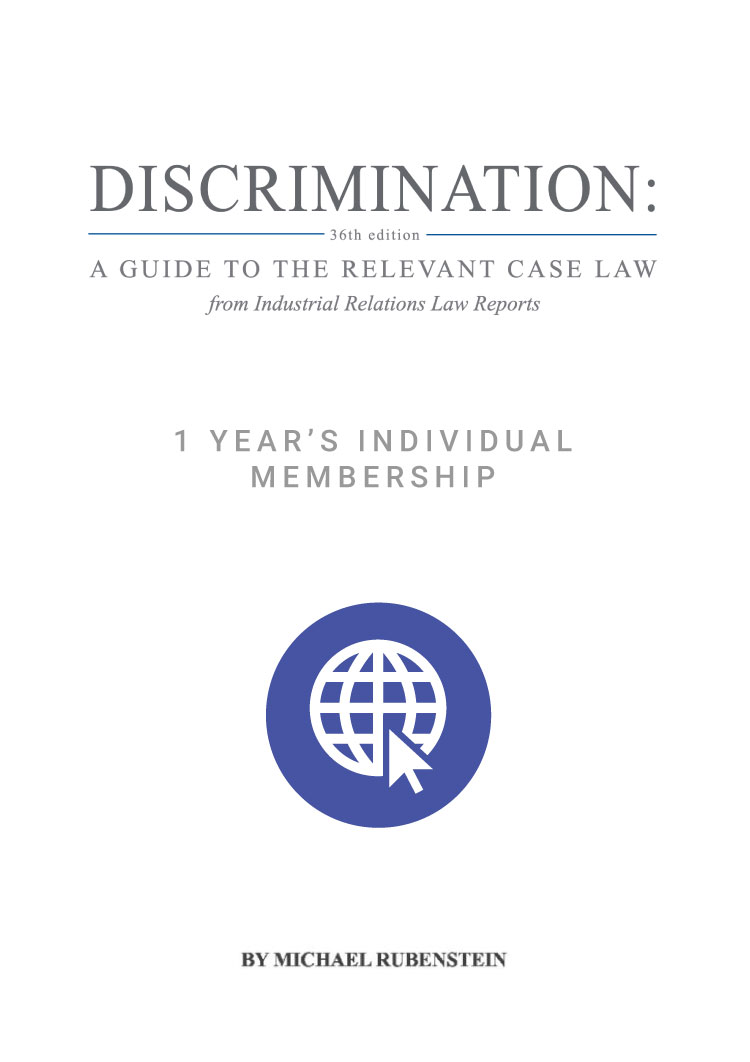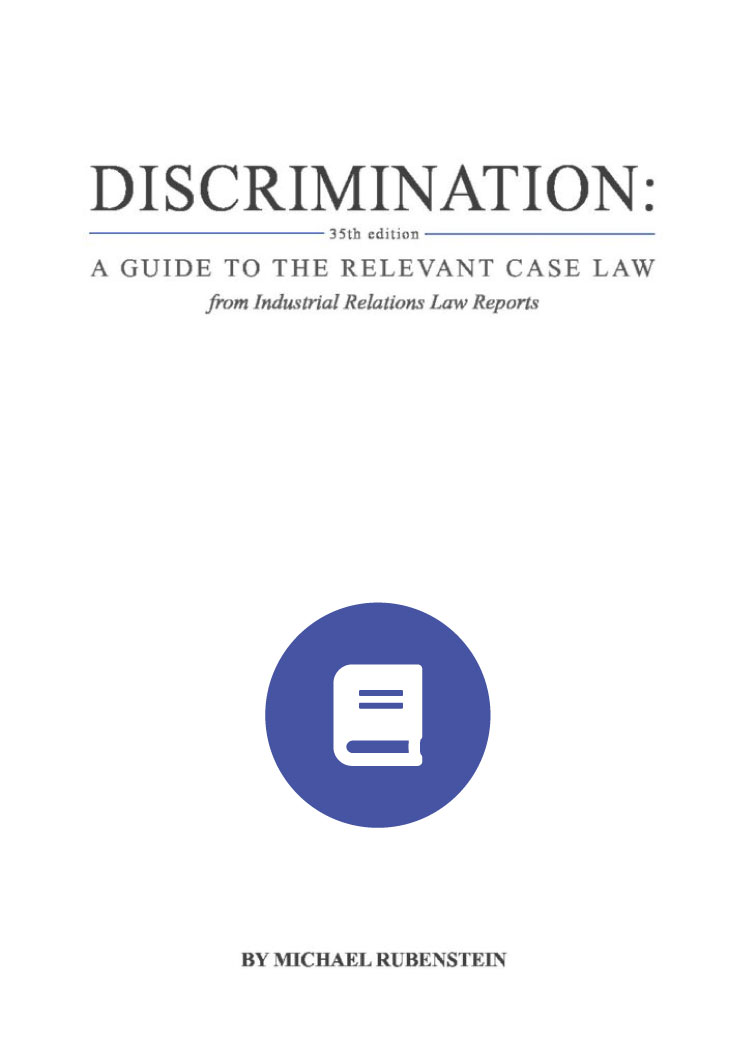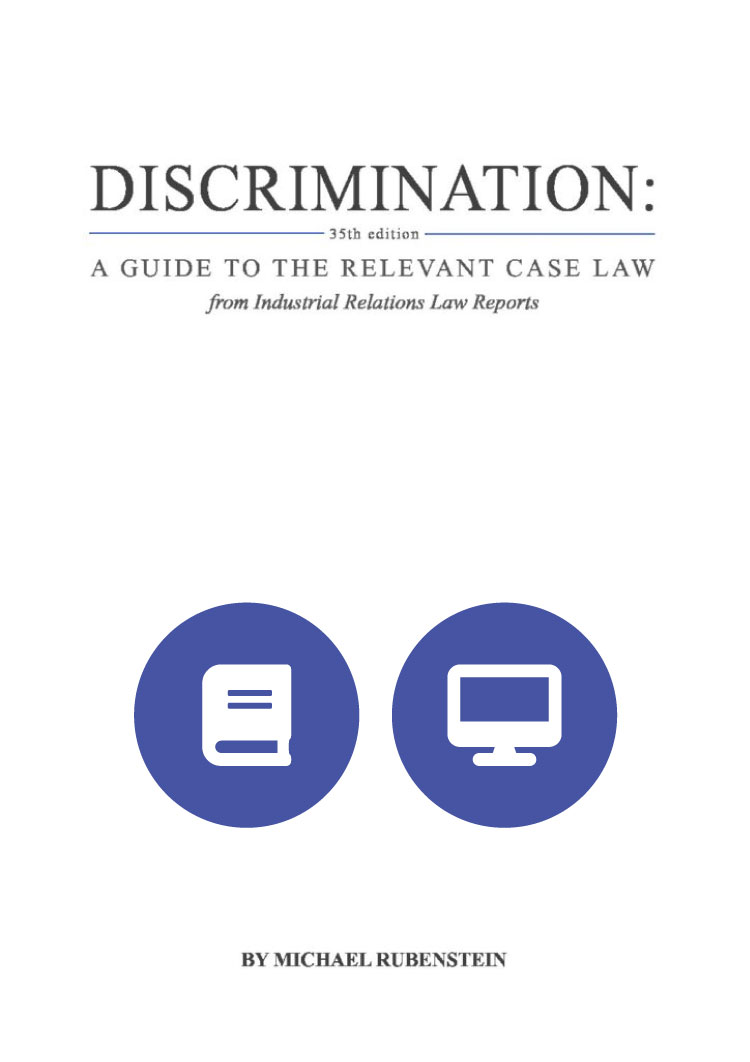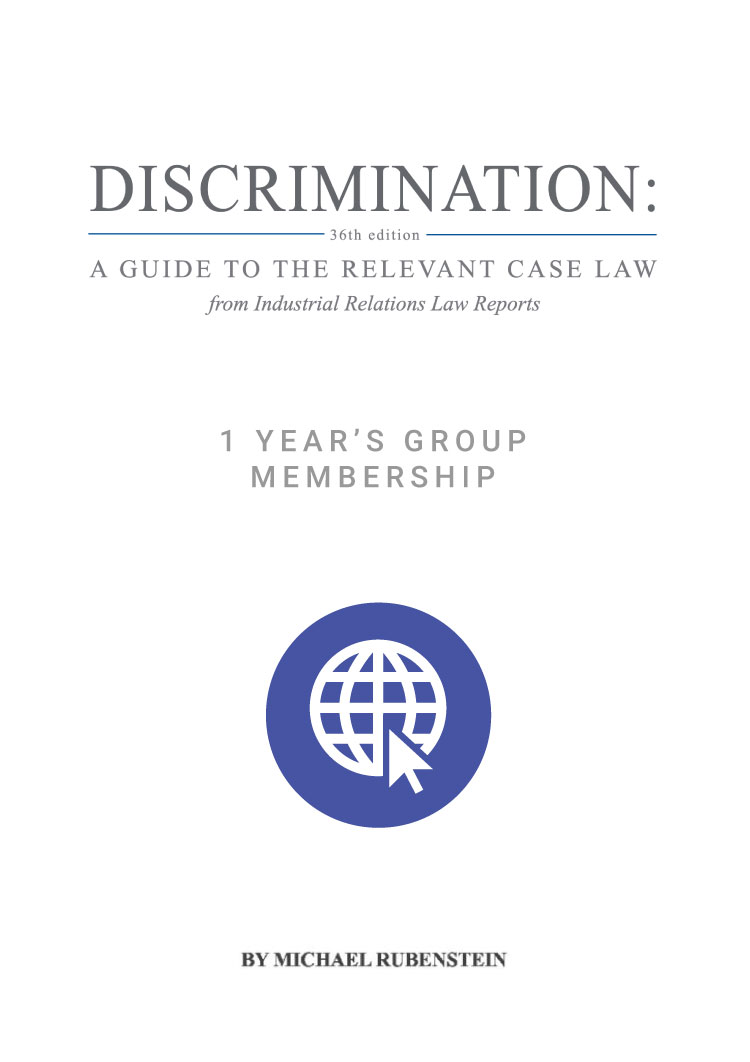37th Edition
Discrimination: A Guide to the Relevant Case Law
By Michael Rubenstein
“One of the most useful books for any Employment Law practitioner.”
Sean Jones KC
Save time and effort with this popular synopsis of the key principles from thousands of discrimination cases showing the current approach of the courts to the range of problems of interpretation posed by the statutes.
The 2024 edition of this unique publication formulates and organises more than 1,200 main principles from reported discrimination cases over the past 45 years that still can be regarded as binding authority.

Online Individual Access – 1 year – 37th Ed
£160.00

Print Copy 37th Ed
£170.00

Print & Online Bundle 37th Ed
£180.00

Online Group Access – 1 year – 37th Ed
£160.00 per member
Group membership access to view the 37th Edition of the Discrimination Case Law Guide online for 1 year for up to 50 members, with banded discounts as follows:
5-9 members: 30% off total price
10-19 members: 35% off total price + 1 free print copy of the Discrimination Case Law Guide
20-29 members: 40% off total price + 2 free print copies of the Discrimination Case Law Guide
30-39 members: 45% off total price + 3 free print copies of the Discrimination Case Law Guide
40-50 members: 50% off total price + 4 free print copies of the Discrimination Case Law Guide
The Team Manager can add team members on their account page after purchase.
DISCOUNTS WILL BE SHOWN IN YOUR BASKET.
Online Access to Discrimination Case Law Guide
If you have purchased online access to the Discrimination Case Law Guide, please click the button below to access it.
The 37th edition takes account of the changes to the case law made by decisions reported in Industrial Relations Law Reports in 2023. The first part of the Guide is organised according to principles that are cross-strand (e.g. how the different ingredients in the definitions of direct and indirect discrimination, victimisation and harassment have been interpreted) with separate sections following on each protected characteristic, focusing on principles specific to that characteristic.
SHIPPING IS FREE IN THE UK
Review
Lucy McLynn
Head of employment at Bates Wells
This compact guide distils the key principles from reported discrimination cases over the last 40+ years. Organised logically and practically by topic and subtopic/s (eg Victimisation – Bad faith; Meaning of disability – Effect of medical treatment) it provides the text of any relevant legislation, followed by a principle by principle summary from the most relevant and current case law. EU and UK law are helpfully differentiated throughout the Guide.
Each summary is succinct (and as pithy as one would expect from the author), ensuring that the content is both easy to navigate and highly digestible. Different principles arising from the same case are dealt with separately, enabling the reader to have a clear focus on a single point of law at any one time. The simplicity of this presentation is highly attractive, especially for a busy professional. It is a deceptive simplicity, however, as very deep knowledge of discrimination law palpably underlies the choice and the synopsis of the cases.
Equally useful as an overview of a topic or in tracking down which case was authority for a particular proposition, this book is an indispensable companion for anyone working in the field of discrimination.
Review
Naomi Cunningham
Outer Temple Chambers
This slim book is now in its 32nd edition. That fact is almost review enough. When it was first published in 1988, the internet was barely thought of, and Harvey had fairly recently (and daringly) expanded to 3 volumes.
When you consider what has changed since 1988, it is extraordinary that a paper volume containing a necessarily highly selective collection of summaries of cases decided by the Court of Justice of the European Union, the Supreme Court, the Court of Appeal and the Employment Appeal Tribunal on questions of discrimination law should retain a place in the employment lawyer’s library. One might think it would have been made redundant years since by highly searchable online caselaw resources – BAILII, Westlaw, Lawtel et al.
I think the answer lies in the fact that it has stayed small and selective: it offers a quick and easy reminder of the main features of discrimination law, and what it loses in comprehensiveness it makes up in comprehensibility, digestibility; and perhaps most importantly, overview. It will never be the end point of research, but it will very often be the beginning.
The organisation is thematic, with many of the sections prefaced by a quotation of the domestic or European legislative provision under consideration. Because of that scheme, some cases recur several times under different headings. There is no attempt to summarise the facts of the cases: each entry is a succinct statement of a legal principle. Some are admirably succinct: the shortest, one of the two entries for Mandla v Lee [1983] IRLR 209, reads simply ‘Sikhs are a group defined by “ethnic origins.”’
Michael Rubenstein is one of the great and the good of employment law. He is a former chairman and now honorary vice-president of the Industrial Law Society, editor of the Industrial Relations Law Reports since they began in September 1972, an honorary Master of the Bench at Middle Temple and many other things besides. Editing the Industrial Relations Law Reports must have given him an encyclopaedic knowledge of employment case law rivalled by few in the profession.
